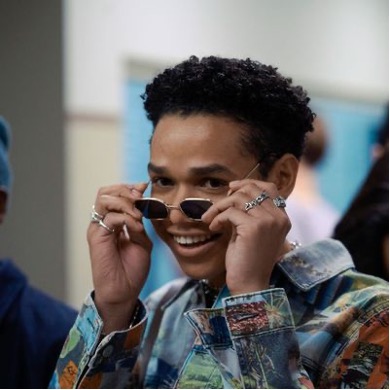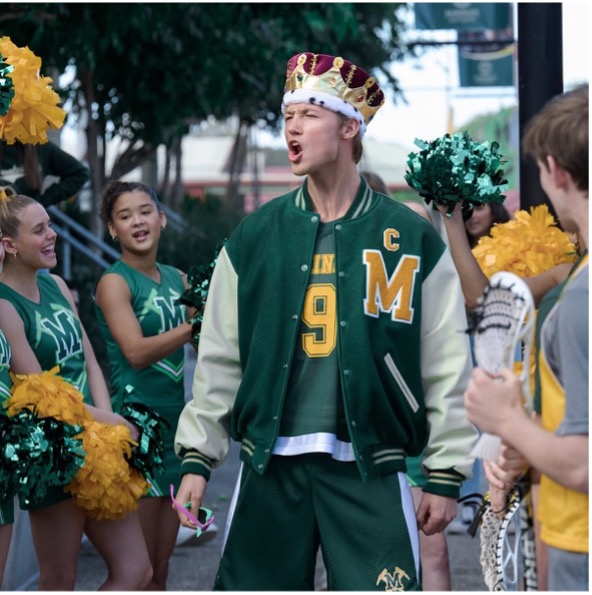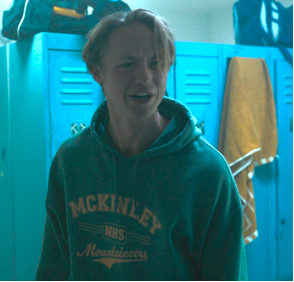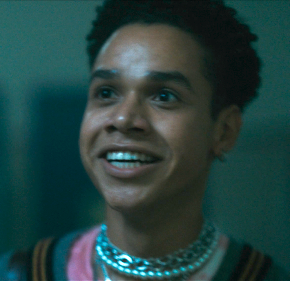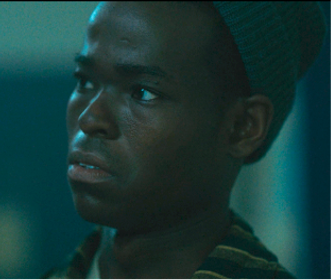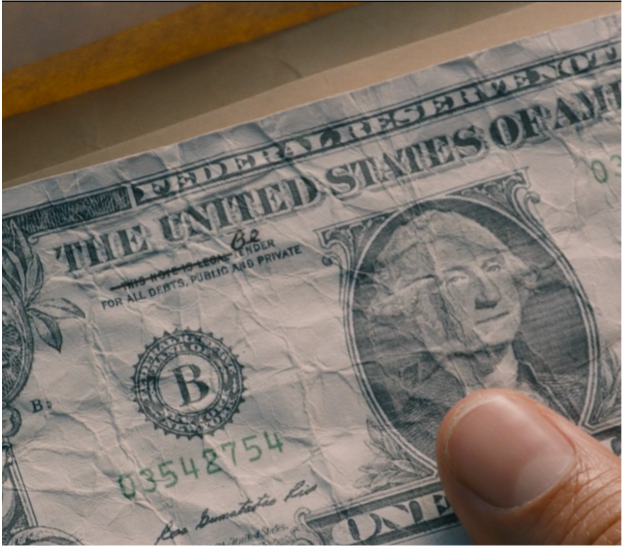The Wilds, an Amazon Prime, 2 season show, created by Sarah Streicher in 2020 follows a group of teens stranded on an island, all of whom have crossed paths in one way or another before the stranding–two brothers, two best friends, and 2 sets of students who went to school together. To those who have watched The Wilds, we all know season 2 did not live up to the hype of season 1. However, I think there are still meaningful stories told and dynamics to analyze in the second season. I am choosing to focus on the argument between two main characters, Ivan and Kirin, during their character-focused episode. While the two went to high school together, they ran in entirely different social circles. Kirin was the stereotypical popular, egotistical jock, and Ivan was a proud, witty, gay teen. I believe the selected scene, and their dynamic as a whole, is a commentary on the totality of “cancel culture”, and its modern-day lack of situational consideration. I cannot begin to imagine the struggles and intersectionality of living life as a young, gay, black man, but I will be discussing my understanding of the message as portrayed.
The conflict begins with Ivan scrolling through the Instagram of Kirin’s lacrosse coach. While deep diving, he uncovers an old photo of the coach doing blackface for a Halloween costume. Ivan exposes this image and gets the coach fired. Ivan is riding the high of being deemed a “hero” and is clearly enjoying the attention he is receiving from exposing the coach. A brief interruption to this buzz, was catching Kirin hugging his coach goodbye and crying, causing Ivan to call him a “sympathizer”.
We don’t know the full story behind Kirin’s relationship with his coach until Ivan and his love interest, Luc, stumble on Kirin sitting alone in the locker room, drinking heavily. Ivan smiles down on him, and begins asking what’s going on, to which Kirin angrily responds that Ivan acts like a know-it-all, who doesn’t know anything about real life. He divulges into how the coach was a father to him, a good man with a wife and kids, someone who took him in when he needed family. Ivan pushes that he protected himself and the school from a bigot. He slowly gets closer to Kirin, with no intentions of defusing the situation but rather aggravating it.
At no point does Kirin actually try to justify the coach’s racist actions, something I think slipped by Ivan, because to him it was an ‘all or nothing’ situation. As Kirin gets increasingly angry, Ivan excitedly pulls out his phone, stating he’s “been waiting for this. The white rage boiling point”. Kirin punches a locker, denying the “white rage” claim. Ivan continually taunts, “you wish that locker had been my face, don’t you?”, with a gleeful expression. The progression of the dialogue in the scene is upsetting and contains the use of a homophobic slur, so to those looking to watch, take this as a trigger warning. Ivan does not stop provoking Kirin and is uncomfortably exhilarated by his increasing anger. I think the following images speak for themselves, as Kirin is in a drunken, emotionally unstable state, Ivan appears gleeful, and Luc looks disturbed by Ivan’s comments.
Kirin screams at Ivan to shut up and get out, refusing to say the things Ivan is probing him to. The scene comes to a climax after Ivan does not cease tormenting Kirin. He insists on calling him homophobic slurs, to which Kirin finally does. Ivan has all of this on video, which gets Kirin expelled.
This is a heavy scene, leaving all 3 characters hurt and disturbed by what took place. In my analysis, I am in no way trying to justify any acts of racism or homophobia portrayed in this episode. Kirin is not in the right; being drunk, hurt, or having any other extenuating circumstance does not warrant bigotry.
However, I do not believe viewers were supposed to interpret Ivan as being in the right either. The look in Ivan’s eyes as he taunts Kirin is hungry and uncomfortable, he wasn’t an underdog hero who prevented further harm but rather incited it. Kirin and his coach deserved consequences, and they received such, but it is revealed to the viewers that Ivan did too. Luc, so upset by the situation, breaks it off with him. He leaves Ivan with the message “Be tender” on a dollar bill he owed him.
I believe this goodbye sentiment supports the message that Ivan was overtly cruel, likely out of fear. As a young, gay, black man, much of the world is out to get him. His fear is understandable, trying to protect himself offensively, rather than leave himself vulnerable to attack. His fear and defensiveness causes him to not just encounter enemies but to make them out of strangers. Kirin had no right to say slurs, but he truly did not seem to do it out of a real hatred for gay or black people–it was borderline coercion. In reality, Kirin was hurting and Ivan was too. To Kirin, Ivan was an unsympathetic attention seeker, and to Ivan, Kirin was a sympathizer and bigot. I believe neither of them was correct, but this episode showed the two imperfect characters at incredibly low moments in their lives.
This is where I believe the show can be extended to a larger metaphor about the world. “Cancel culture”, while at times truly does give harmful people the consequences they deserve, has also become bloodthirsty. There is no black and white in the way society “cancels” people nowadays. Someone is good, until they inevitably mess up, and then they are irredeemably bad. The general media shows no mercy, nor the ability to portray someone as simply human, i.e., flawed.
Ivan felt that he was protecting his community by canceling the enemy he saw in Kirin. What he didn’t see was the nuances of the situation. Kirin didn’t say his coach shouldn’t be punished for blackface, and was, not so eloquently, expressing the massive grief he felt at losing another father figure. It is possible for his coach to have been a loving person to Kirin, while also being incredibly ignorant and insensitive to the impact of his actions. It is important to understand that situations are not so cut and dry. Someone could get canceled over a viral video that makes them out to be a horrible person, when in reality, we caught a glimpse into one of the worst days of someone’s life. I believe most of us could only hope to be shown grace, were we to mess up during one of our lowest moments.
Through this character pairing of Ivan and Kirin, The Wilds, portrays how quickly fear can devolve into violence. Kirin could not understand the root of Ivan’s defensive demeanor– someone who will be faced with hate and prejudice his whole life. Similarly, Ivan could not see where Kirin was coming from due to his preconceived notions about him. While this depiction was a hard watch, and deeply sad from multiple angles, the creators very masterfully challenged our usual assumptions about a protagonist and antagonist. You’d think with a white, straight jock versus a black, queer character, it’s not difficult to assume who is the hero and who is the villain of the scene. However, the show writers didn’t allow for such an easy interpretation. It is an uncomfortable position for a viewer to not know who is right or wrong.
Nowadays, there is a level of overcompensation when trying to be politically correct, in order to avoid the mob mentality of “cancel culture”. That’s not to say society didn’t need to advance its sensitivity and empathy towards others, but one must think critically and look for a larger picture before pointing a finger and slapping a label on someone. Humans will make mistakes, especially young ones, and deeming them an abhorrent person dismisses a chance to better themselves and learn. Ivan and Kirin eventually make amends, and show how capable of growth and compassion they are. Rather than crucify all who make mistakes, people should be allowed an opportunity to become a more understanding, educated, and loving person.

